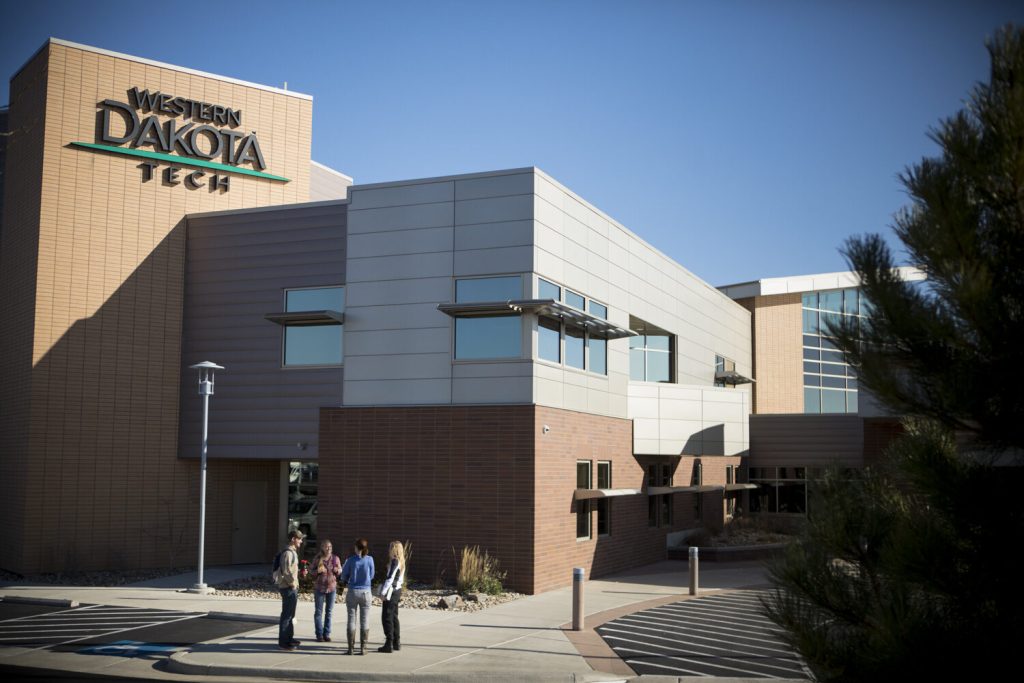RAPID CITY, S.D. – The Law Enforcement Officers Standards Commission voted unanimously on Wednesday to end its articulation agreement with Western Dakota Technical College.
The Rapid City school had been one of three in the state with an “articulation agreement” through the commission that offers a quick path to certification for graduates of its police-focused criminal justice program. The others are Lake Area Technical College in Watertown and Southeast Technical College in Sioux Falls.
Western Dakota was the first to ink an agreement with the state in 1997. Southeast followed in 2005; Lake Area signed its agreement in 2015.
The agreements allow law enforcement-track graduates to bypass a 13-week stint at the Law Enforcement Training Academy and earn “reciprocity” through the commission, meaning their degree and the passage of a reciprocity exam are enough to certify them as South Dakota peace officers.
The agreements also allow the commission to terminate the contracts with 60 days’ notice. Commission member Steve Allender told South Dakota Searchlight after Wednesday’s meeting that he doubts there’s a path forward for Western Dakota to return to the commission’s good graces.
“It’s not believed they’re going to be able to come into compliance or that they’re willing to come into compliance,” Allender said.
Each school with an articulation agreement must meet certain requirements. One is for instructors to have, maintain and document a “nationally recognized credential” in their area of expertise.
Last month, the school asked the state to lower its standards for instructor training, according to Hank Prim, the training administrator with the South Dakota Division of Criminal Investigation.
“During the course of that conversation, we learned that certain emergency vehicle operation course (EVOC) instructors did not hold the nationally recognized expertise credential,” Prim said.
The school’s December request came after nearly two years of back-and-forth to bring the program back into compliance with expectations, Prim said. As late as November, Prim saw a path forward for the school through remediation.
The late-stage request for an adjustment in standards was a final straw for commissioners.
“It isn’t supposed to be a shortcut,” Andy Howe, the Clay County sheriff and a member of the commission, said after the meeting. “The students put in the effort, and there’s no reason that the standards should be lowered.”
Western Dakota Tech did not attend the commission meeting. Ann Bolman, president of Western Dakota Tech, said in a statement afterward that she was “surprised” to learn of the commission’s decision, and that the school hopes to work with the commission to come back into compliance with program requirements within 60 days. That’s the number of days it takes for a termination to take effect under the terms of the articulation agreement.
Bolman’s statement noted that the school’s program recently earned accreditation from the Commission on Accreditation for Law Enforcement Agencies, Inc. An April 2023 press release from the school on that accreditation says the process involved “a rigorous self-assessment, requiring a review of policies, practices, and processes against internationally accepted public safety standards.”
That accreditation doesn’t clear a path for state-level, graduation-based officer certification, but Bolman offered it as evidence that her school’s law enforcement program can prepare students for police work.
“As we strive to meet the highest standards in all of our programs, and were preparing for our next annual audit, we had asked the Commission to please clarify training agencies for EVOC instructors and are awaiting response,” Bolman wrote. “It is our desire to work with the Commission to resolve any concerns it might have and fulfill its reciprocity requirements in the 60-day period before the agreement is slated to end.”
Trouble started in 2022
Western Dakota Tech had been in “noncompliance” status with the state commission since spring of 2023. As with the termination of its agreement this week, the school’s placement in noncompliance status only came after several problems.
In April of 2022, five of the 12 Western Dakota students who took the reciprocity exam failed.
Those students, it turned out, hadn’t finished their coursework, Prim said. The school accused the state Division of Criminal Investigation of pushing the students to take the exam early, Prim said, and asked that the five be allowed to re-test.
An investigation, which included interviews with students and faculty, revealed that the school had chosen the testing dates, Prim said.
That set in motion a series of meetings, audits, interventions and efforts on the part of the law enforcement training to address four main issues at the school:
- Inaccurate or false reports.
- Students testing before final semester.
- Failure to report required retention information.
- Failure to produce instructor credential records.
The commission was informed that the school had been placed on noncompliance status at its April meeting. At each commission meeting since, Prim has updated its members on remediation plans and potential paths forward.
The Wednesday meeting was the first at which Prim suggested taking action, although he did not recommend termination of the agreement with the school. He presented it as one of three options. Commissioners also could have voted to suspend the school, or continue working through remediation.
After about 40 minutes of discussion in a closed executive session, the commissioners returned to cast their votes in favor of termination.
Reaction from commission
Allender, a former Rapid City police chief who later served as his city’s mayor, told South Dakota Searchlight after the meeting that the loss of Western Dakota Tech as a reciprocity-ready school after so many second chances is “embarrassing.”
“There’s just been either a lack of willingness or lack of ability to come into compliance. There’s been finger pointing, I think, going on. But I’ve seen all the documentation, and I’m embarrassed, not only for Western Dakota, but I’m embarrassed that the state has spent so much time and so much effort trying to get this organization into compliance.”
Commissioner and Lincoln County State’s Attorney Tom Wollman said after the meeting that he cast his vote after considering that the school had “been given ample time to remedy the situation,” but did not seem interested in doing so.
“I was shocked that they didn’t have anybody at the meeting,” Wollman said.
Western Dakota was not notified about or invited to the meeting, spokesperson Pam Stillman-Rokusek said Thursday. DCI spokesman Tony Mangan confirmed that no invitation had been offered.
The loss “certainly doesn’t help” to address a shortage of qualified law enforcement in the state, Allender said. But he also said the school had been producing fewer graduates in recent years.
The statement from the school said that 13 students graduated from the program in spring of 2023. A year earlier, the statement said, nine students made it all the way through.
Howe, the Clay County sheriff, said he doesn’t expect the Western Dakota Tech issue to have a serious long-term impact. There are criminal justice graduates all over the state, educated at other two- and four-year institutions.
“Those programs don’t produce certifications, but they do produce graduates who have that criminal justice focus,” Howe said.
Western Dakota will still have its program, as well, Howe said. At the commission meeting, Prim said that law enforcement trainers will work with the current students in the Western Dakota program to make sure they’re able to take the reciprocity exam after completing their coursework.
Bolman, the Western Dakota Tech president, said the school will maintain its law enforcement program, which is one track a student can choose as they work toward a two-year criminal justice degree.
“The reciprocity agreement is not necessary for WDTC to offer the Law Enforcement program,” Bolman wrote. “It is a benefit to employers as it streamlines their onboarding process for new officers. It is the desire of WDTC for the reciprocity agreement to continue as it helps in the effort to meet the workforce shortage for law enforcement agencies.”













